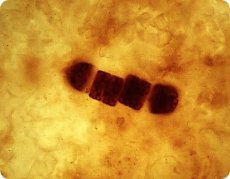Ancient bacteria that are resistant to antibiotics are found out
Last reviewed: 23.04.2024

All iLive content is medically reviewed or fact checked to ensure as much factual accuracy as possible.
We have strict sourcing guidelines and only link to reputable media sites, academic research institutions and, whenever possible, medically peer reviewed studies. Note that the numbers in parentheses ([1], [2], etc.) are clickable links to these studies.
If you feel that any of our content is inaccurate, out-of-date, or otherwise questionable, please select it and press Ctrl + Enter.

A group of scientists in a remote cave in the US state of New Mexico discovered a previously unknown species of bacteria living in complete isolation from the outside world for at least the last 4 million years. Inside the 200-kilometer cave in the place where bacteria were found, there is a closed own ecosystem and own microclimate. According to experts, not only is the fact that bacteria are in a closed system from 4 to 7 million years, but also that they are completely immune to antibiotics.
Experts say that the bacteria found have their own mechanism of blocking antibiotics, the study of which will help to understand the specific features of the natural mechanisms of resistance of certain bacteria and microbes to antibiotics. Researchers note that in a huge cave there is a microbiomy regime of its own, which for millions of years affected the genome of microorganisms, making them unaffected by antibiotics.
According to the authors of the study, direct contact with resistant ancient bacteria had only 4-6 people who performed sampling in the cave. In total, scientists discovered 93 different kinds of bacteria in the cave, many of which exhibit resistance to antibiotics. Now experts can not give an unambiguous answer to the question of which factor became the driver of the mutations.
On the other hand, experts note that studying new cave bacteria, it is possible to create a new class of more powerful antibiotics, which will differ from modern drugs with greater versatility.
The article says that a number of the detected bacteria possess such a rare property as the extensive multiple drug resistance, which makes these bacteria immune to modern medicines. Experts are sure that such features, which speak of the dissimilarity of "cave bacteria" on their more common relatives, are a side effect of autonomous existence and isolated evolution.

 [
[